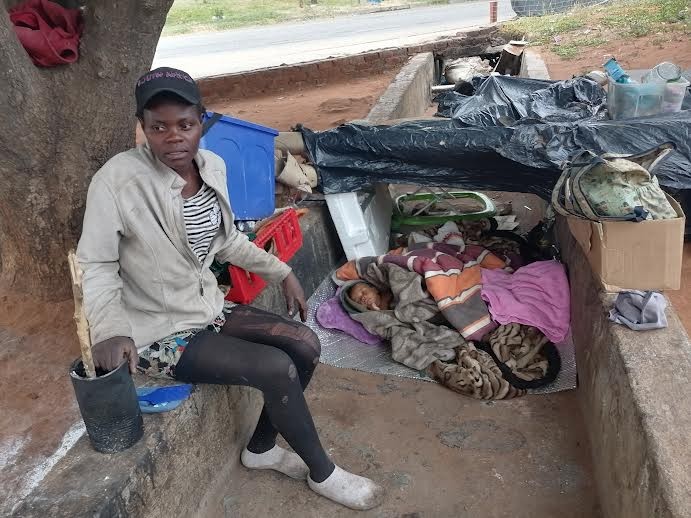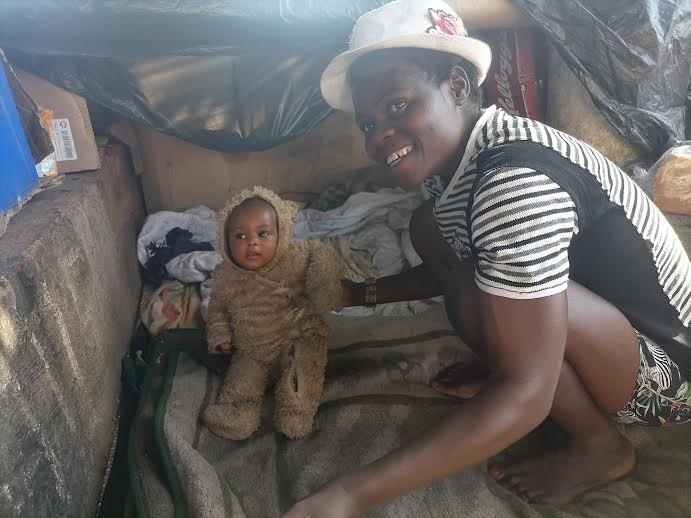Panashe, four months old, lives in a ditch with his mother
Melissa Gwarimba just wishes the Musina municipality would provide bathrooms for homeless people
Melissa Gwarimba lives in a ditch in Musina with her son Panashe. Photos: Bernard Chiguvare
- Melissa Gwarimba came to South Africa ten years ago from Zimbabwe.
- When she could not find work, she ended up living on the street in Musina, Limpopo.
- Her four-month-old son Panashe lives with her in a ditch under a mango tree near the Post Office.
Next to the Musina Post office is a ditch running east from the N1. Under a mango tree, black plastic bags cover part of the ditch. This is the home of Melissa Gwarimba and her four-month-old son Panashe.
Gwarimba dropped out of school in Zimbabwe after the death of her father, who had been taking care of her, and came to South Africa in 2013.
“I really thought it was going to be easy for me in South Africa but I could not secure any job, leading me to live on the streets,” she said.
Panashe’s father also lives on the streets, though they are not together any more.
Gwarimba finds occasional work gardening or sweeping yards, but it is difficult looking for work with a baby. “If the weather is cold or very hot I cannot walk around with my child. I have to beg for food from nearby stores, or wellwishers drop me some food,” said Gwarimba. She takes the child around in a stroller she found on a rubbish dump.
When GroundUp visited her on Saturday, the weather was fine and she was about to go out on a job. “It is about to be winter. Panashe needs warm clothes and blankets. I also need nappies for him. Usually when I run out of nappies I tear off one of my clothes to use as nappies,” she said, looking down at a smiling Panashe.
She works with the child on her back or wraps him in a blanket and finds some shade for him to sleep in.
What she would like most is access to a bathroom. Living on the street, she has to wash out in the open at night and it is dangerous.
“I have to bath at night in an open place but I feel insecure. Men take advantage of this situation. I really beg the municipality to provide bathrooms for us,” she said.
Panashe needs warm clothes for winter, says his mother Melissa Gwarimba.
Joshua Kwapa, Limpopo Department of Social Development spokesperson, said building bathrooms is the responsibility of the municipality. But Wilson Dzebu, Musina municipality spokesperson, told Groundup that the municipality cannot build bathrooms for homeless people as this would encourage people to live in the streets. “Instead we encourage these homeless people to get to shelters in Musina,” he said.
There are at least four shelters in Musina, for men, for girls, for boys and for women and children. But Gwarimba and other women GroundUp spoke to say they prefer to live on the streets because the shelters have strict rules about entrance and exit times which do not suit them.
More and more women are living on the streets, says the manager of Musina Home Based Care, Tapiwa Zvauya. “We are not sure how many there are. The authorities seem not to give much attention to the challenges faced by people living on the streets,” said Zvauya.
Yvonne Maunganidze, has been living on the streets since 2013. She lives near the taxi rank with her three children and a friend.They beg at Musina Mall, and the two older children, aged 7 and 10, beg from motorists while she sits under a tree with her two-year-old begging from passers-by. The children have never been to school.
Eunice Madinginye, who runs “Musina Help Me To Quit”, an organisation which helps people dealing with substance abuse, said some of the women living on the street are victims of exploitation by men who promise to look after them. She says she wishes her organisation could provide meals for the women on the street, to make them less vulnerable.
“We are sure then they will not be easy prey for men,” she said.
Support independent journalism
Donate using Payfast

Next: Celebrating Langa through its artists
Previous: Freedom Day in Philippi: gunshots, robberies and piles of rubbish
© 2023 GroundUp. This article is licensed under a Creative Commons Attribution-NoDerivatives 4.0 International License.
You may republish this article, so long as you credit the authors and GroundUp, and do not change the text. Please include a link back to the original article.
We put an invisible pixel in the article so that we can count traffic to republishers. All analytics tools are solely on our servers. We do not give our logs to any third party. Logs are deleted after two weeks. We do not use any IP address identifying information except to count regional traffic. We are solely interested in counting hits, not tracking users. If you republish, please do not delete the invisible pixel.


